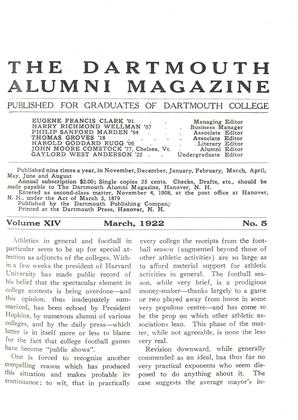The editorial printed below appeared in the Rutland, Vt. Herald of January 20, 1922. It is here reproduced together with an answer from Clifford H. Smith '79, since the editorial presents a regretable misapprehension of the purpose of the new selective process to which Mr. Smith has made a convincing reply.
FORGETTING TRADITIONS
President Hopkins of Dartmouth, in discussing the over-crowded conditions of American colleges, outlined at a meeting of Chicago alumni of the New Hampshire institution qualifications which he believes should be the basis of admission to eastern colleges and among such qualifications includes "the voctional background of parents."
Passing over the obvious scholastic. requirements and not raising any question as to "geographical distribution," one of the qualifications Dr. Hopkins would require, we would ask Dartmouth's president by what line of reasoning has the "vocational background of parents" anything to do with admission of men and women to such higher institutions of learning as he presides over.
Would Dr. Hopkins, in admitting students to his college, discriminate in favor of the sons of lawyers, doctors, capitalists, financiers, professors, against the sons of those who earn their livelihood on the farms, in the mills and factories, in the quarries ?
We are unable to imagine President Bailey of the University of Vermont, President Moody of Middlebury college, President Plumley of Norwich University or, to go east of the Connecticut river, President Hetzel of New Hampshire State college arguing that the. vocational background of parents has anything to do with the gratification of a man's or woman's ambition to secure a college education.
Without intimate relations with Dr. Hopkins and, we confess, unable to appreciate his suggestion that the vocation of a man's father might possibly bar the son from being' admitted to Dartmouth, we would remind the head of New Hampshire's greatest educational institution that the history of his college has not been written by men bred exclusively in the purple.
A striking example of a "vocational background" that might not appeal to Dr. Hopkins can be cited in the case of a life member of the board of trustees of Dartmouth—Gov. Albert O. Brown of New Hampshire. Gov. Brown's parents grubbed a livelihood from a farm in one of the most sterile sections of New Hampshire and their "vocational background" stimulated their ambitious son to seek a broader field.
Without assuming to tell Dr. Hopkins that he has an altogether different angle of mind regarding the admission of men to Dartmouth college than has the majority of the alumni of that institution, we will suggest that such prominent and influential alumni as Frank S. Streeter, Chief Justice Parsons of New Hampshire and ex-Gov. John H. Bartlett of the same state will not subscribe to such a radical proposition as giving the least concern to the "vocational background of parents" in admitting men to college—Dartmouth college in particular.
Dr. Hopkins has been credited with possessing more of the baccilli of socialism than his predecessors, but such argument as he advanced in his talk in Chicago this week will find him charged with being an aristocrat, rather than a socialist.
If tradition is an asset, we would suggest that Dartmouth college will not gain by adopting in its entirety the plan outlined by President Hopkins for admission of men to the institution. We have an idea that the trustees will materially amend the proposal.
To the Editor of the Herald:
If you had sought authoritative information before writing your somewhat caustic editorial about Dartmouth college in your issue of January 20, perhaps you would have avoided missing the point so entirely. President Hopkins' reference to "the vocational background of parents," has no such meaning as you gave it, but quite the contrary, and instead of running the risk of disapproval of the trustees it is already adopted by them, and most heartily approved by the alumni.
In the official- statement of "The Selective Process for Admission," article 5 is as follows: "The principle of Professional and Occupational Distribution shall be used to choose among groups of men otherwise equally desirable and shall be used especially to protect in selection men properly qualified scholastically, but to whom available aid is essential for undertaking a college course."
Since the new rule has in mind the helping of just such men as those named by you, and as at least two of those whom you name are trustees responsible for the rule, it hardly seems necessary to worry about their attitude toward the position taken by President Hopkins.
When college authorities have the stupendous task of selecting five hundred candidates whom they can admit out of five thousand applications, it must be admitted that their work is a difficult one. And if there is in the country any body of men who whole-heartedly and enthusiastically stand behind the administration of their college, you may depend upon it, the Dartmouth alumni are the ones.
Yours respectfully,
Ludlow, Vt., January 21, 1922.
 View Full Issue
View Full Issue
More From This Issue
-
 Article
ArticleCOLLEGE DISCIPLINE
March 1922 By EDWIN JULIUS BARTLETT '72 -
 Article
ArticleAthletics in general and football in particular seem to be up for special
March 1922 -
 Article
ArticleTHE COLLEGE GRANT
March 1922 By JOHN M. GILE '87 -
 Article
ArticlePRESIDENT HOPKINS EXPOSES "FUNDAMENTALIST" MOVEMENT
March 1922 -
 Article
ArticleTWELFTH WINTER CARNIVAL A HUGE SUCCESS
March 1922 -
 Sports
SportsBASKETBALL
March 1922








